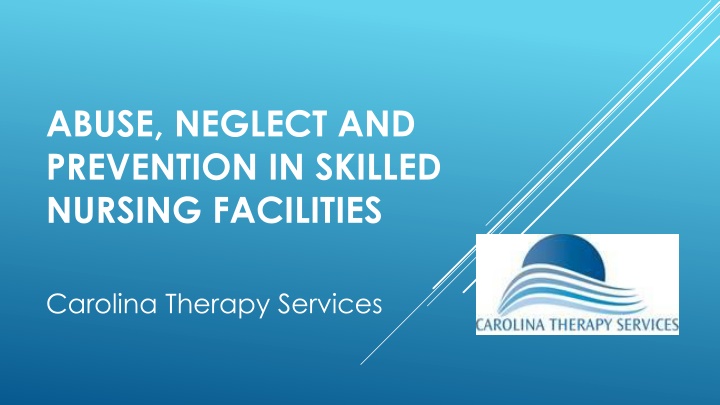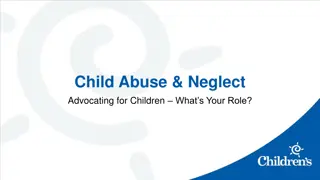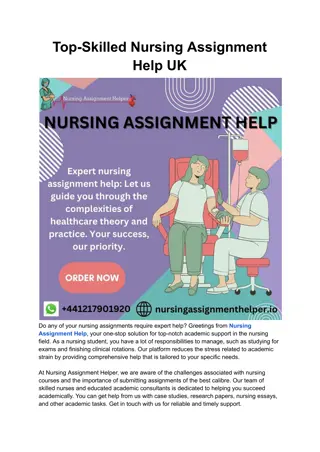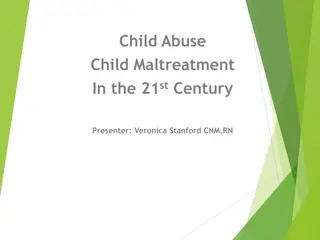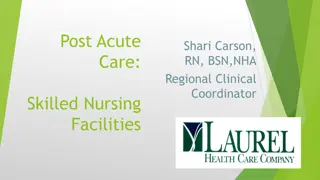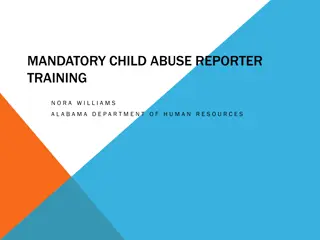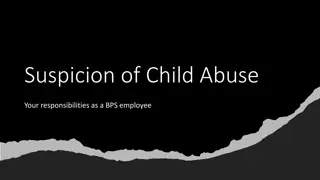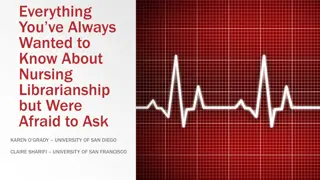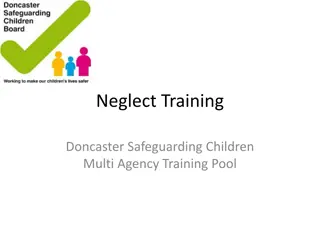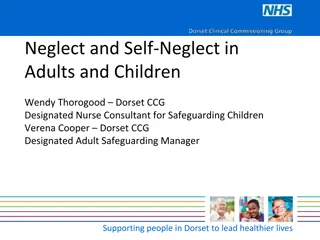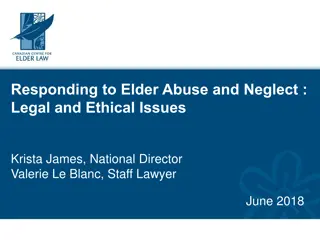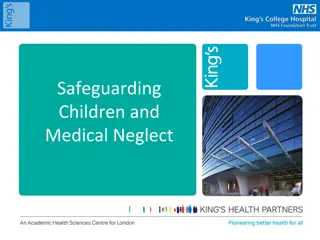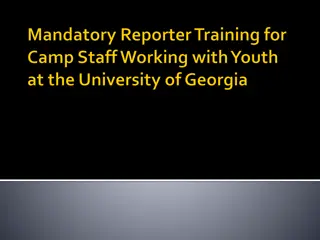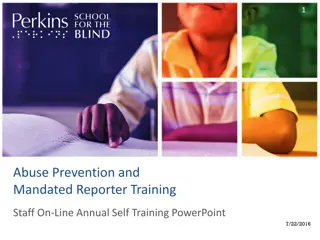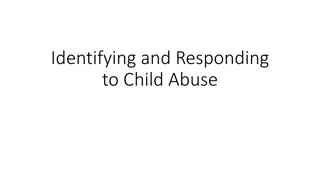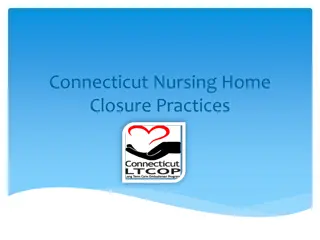Preventing Abuse and Neglect in Skilled Nursing Facilities
Carolina Therapy Services emphasizes the prevention of abuse, neglect, and mistreatment in skilled nursing facilities. They provide medically related services to prioritize the physical, mental, and psychosocial well-being of residents while upholding their dignity and respect. The organization strictly prohibits any form of abuse, including physical, verbal, mental, sexual, and financial abuse. Residents have the right to be free from abuse, neglect, and exploitation, and it is essential for staff and residents' advocates to understand the signs of abuse and how to report it.
Uploaded on Sep 28, 2024 | 3 Views
Download Presentation

Please find below an Image/Link to download the presentation.
The content on the website is provided AS IS for your information and personal use only. It may not be sold, licensed, or shared on other websites without obtaining consent from the author.If you encounter any issues during the download, it is possible that the publisher has removed the file from their server.
You are allowed to download the files provided on this website for personal or commercial use, subject to the condition that they are used lawfully. All files are the property of their respective owners.
The content on the website is provided AS IS for your information and personal use only. It may not be sold, licensed, or shared on other websites without obtaining consent from the author.
E N D
Presentation Transcript
ABUSE, NEGLECT AND PREVENTION IN SKILLED NURSING FACILITIES Carolina Therapy Services
Therapy services will provide the medically related services to attain or maintain the highest practicable physical, mental and psychosocial well being of each resident. The therapy staff will assure that the residents are cared for in a manner and in an environment that promotes maintenance or enhancement of each resident s quality of life, dignity and respect in full recognition of his or her individuality No one should assume that a resident will deteriorate, fall, become demented, etc, just because of age or diagnosis
CTS strongly prohibits abuse, neglect and/or mistreatment of residents and misappropriation of resident's property. Staff shall not use verbal, mental, sexual or physical abuse, corporal punishment or involuntary seclusion for any resident. ABUSE PREVENTION
Abuse is the willful infliction of injury, unreasonable confinement, intimidation, or punishment with resulting physical harm, pain or mental anguish. Abuse also includes the deprivation by an individual, including a caretaker, of goods or services that are necessary to attain or maintain physical, mental, and psychosocial wellbeing. This presumes that instances of abuse of all residents, irrespective of any mental or physical condition, cause physical harm, pain or mental anguish. It includes verbal abuse, sexual abuse, physical abuse, and mental abuse including abuse facilitated or enabled through the use of technology. Willful, as used in this definition of abuse, means the individual must have acted deliberately, not that the individual must have intended to inflict injury or harm. DEFINITION OF ABUSE
All residents in nursing homes have the right to be free from abuse, neglect, and exploitation, and misappropriation of property.* This includes freedom from bodily punishment, involuntary seclusion, and any physical or chemical restraint not required to treat your medical symptoms. Residents, families, friends, and advocates should understand residents rights to be free from abuse, facility responsibilities to protect residents from abuse, signs of abuse, and how to report abuse. ABUSE IN LONG TERM CARE
Physical Sexual Verbal Mental Psychosocial Financial TYPES OF ABUSE
A CNA takes a video of a cognitively impaired resident eating lunch in the facility dining room. In the video, the resident is seen eating mashed potatoes with her fingers. When the video is shown to other staff, they think the video is funny. The CNA later posts the video to her social media page titled Miss Piggy . A housekeeper likes to pick and play with a male resident even though the resident has asked the housekeeper to stop. The resident feels humiliated and embarrassed. This is ABUSE! This is ABUSE! EXAMPLES OF ABUSE
Improper use of chemical restraints- residents with behavioral symptoms such as yelling, striking out or undressing in public are given drugs to control these actions. Improper use of physical restraints- residents who are physically active are placed in recliners, wheelchairs, or beds from which they cannot exit. Rough handling during caregiving, medication administration, or moving a resident OTHER EXAMPLES
Deliberatively failing to provide care or assistance necessary to prevent harm. Pushing, hitting, pinching, or grabbing a resident. Not allowing a resident to go to the bathroom. Isolating a resident from others or confining a resident to his/her room as a means of punishment or restricting a resident s movement. Taking or using photographs or recordings that would demean or humiliate a resident, including posting on social media. OTHER EXAMPLES
Example: Ms. Smith, a comatose resident receives a bottle of perfume for Christmas as a gift. The caregiver figures it will not be used so she takes it home for herself. Using a resident s money or personal property without their consent. A resident s possessions may hold great sentimental value. We play an important role in maintaining a feeling of security for our residents. MISAPPROPRIATION OF A RESIDENT S PROPERTY
Unexplained injuries such as wounds, cuts, or bruises. Restraint or grip markings. Sudden or unexplained changes in the resident s behaviors and/or activities, such as fear of a person, activity or place, or feelings of guilt or shame. SIGNS OF ABUSE
Abuse = Based on Action Neglect = Failure to Act ABUSE VS NEGLECT
A task or function not performed or when there is a failure to act Failure to provide goods and services necessary to avoid physical or mental anguish Ignoring what the resident needs for his or her well-being Failure to follow the care plan. Please be careful not to forget a resident need. http://sunnybrook.ca/image.asp?w=250h=375i=FoodTray.jpg NEGLECT
Incorrect body positioning -- which can cause limb contractures and skin breakdown. Lack of assistance with toileting or changing of disposable briefs which can cause incontinence, increased falls, agitation, indignity, and/or skin breakdown. Lack of assistance with eating and drinking -- which can cause malnutrition and dehydration. Lack of assistance with walking which can lead to lack of mobility. EXAMPLES OF NEGLECT
Lack of assistance with personal hygiene and appearance. Ignoring call bells or cries for help. Failure to or delayed contact to medical personnel when a resident has a significant change in condition. Untreated bed sores. Residents who wander away from the facility. EXAMPLES OF NEGLECT
Working in a long-term care facility is mentally and physically demanding! Because of this, care giving can be stressful. Stress can lead to unintended actions by caregivers; which may be considered abuse, neglect, or mistreatment. Please speak to your supervisor if you are feeling stressed. STRESSFUL WORK ENVIRONMENT
Always deal with a resident in a calm, non threatening manner Be aware of the residents body language, try to maintain eye contact Put yourself in the place of the resident, try to gain a genuine understanding of the person as a individual If you feel like you may lose control of the situation, walk away(provided the resident is in a safe environment) Try to regain control of your emotions, use different stress relief techniques ALWAYS get help from a coworker. If you are unsure in anyway, always ask for assistance. INTERVENTION STRATEGIES WITH AGGRESSIVE RESIDENTS
The North Carolina Nursing Home Patients Bill of Rights protects, among other things, the following rights of residents: To receive care that is appropriate, adequate, and in compliance with the law To be treated with consideration and respect To receive a bill itemizing charges for treatment received Privacy To be free of abuse and of physical or chemical restraints To receive a reasonable response from the nursing home to all requests To associate and communicate privately with friends of their own choosing To be free from work in the facility, and, To retain their personal possessions NC BILL OF RIGHTS FOR NURSING HOME RESIDENTS
Older adults do not lose the right to make decisions regarding all aspect of life. Residents rights protect older adults right to continue participating in and managing their life when staying at a facility. RESIDENT RIGHTS
The resident has the right to have personal privacy in the facility. All staff members, visitors and volunteers have the responsibility to provide for each resident the respect and dignity and the right to privacy at all times. DIGNITY
You MUST always knock on the resident room door and DO NOT enter unless verbally instructed to do so. Staff members must draw privacy curtain and resident room blinds for all care being given to resident. No one except those responsible in delivering care at that time, is allowed behind closed curtains. No pictures or videos may be taken of the resident or their room without written permission. This will be considered an act of abuse and will be investigated. PRIVACY
Advance Directive This is a set of directions given about the medical and mental health care an individual would want if they ever are unable to make their own decisions Be sure to know your resident s wishes so we can honor them. Ex: Do Not Resuscitate, Power of Attorney CARE DECISIONS AND ADVANCE DIRECTIVES
If any resident or family member inquires about discharge from the facility, please refer them to the facility Director of Social Services. The decision to discharge from the facility must be made by the interdisciplinary team NOT JUST THERAPY DISCHARGE PLANNING
If you see or hear about abuse or neglect, you must: Make sure the resident is safe if the act just occurred. Immediately inform therapy program manager. The manager will immediately notify the facility DON and Administrator. May be required to provide a statement as part of the investigation. CTS Corporate Compliance Plan: Report to Clinical Specialist and/or Compliance Officer HOW TO REPORT
Clinical Specialists Brad Myers: 252-229-5761 Donna Overton: 910-835-8066 Stacy Rivera: 984-249-8215 HR Director Chastity Strickland: 910-892-0027 Compliance Officer Kim Schmidlin: 910-892-0027 FOR QUESTIONS OR ASSISTANCE
